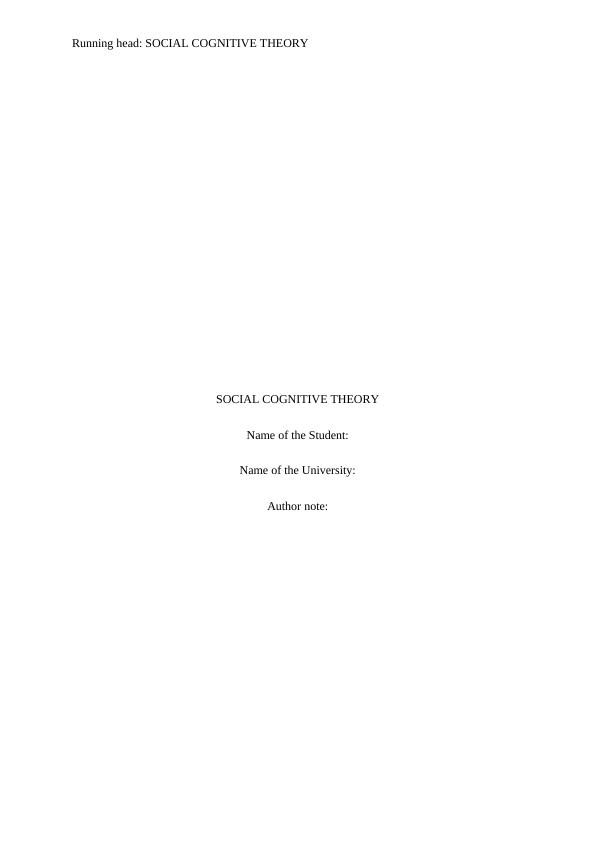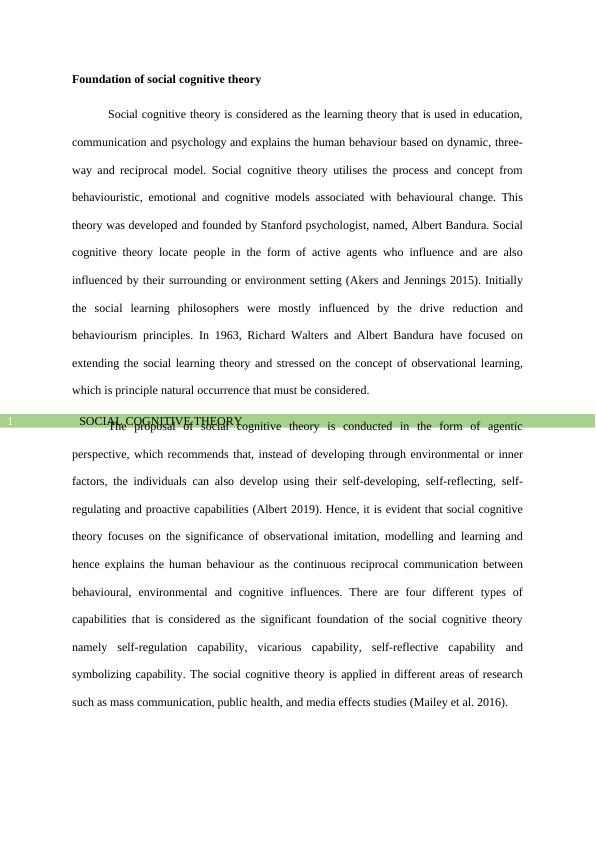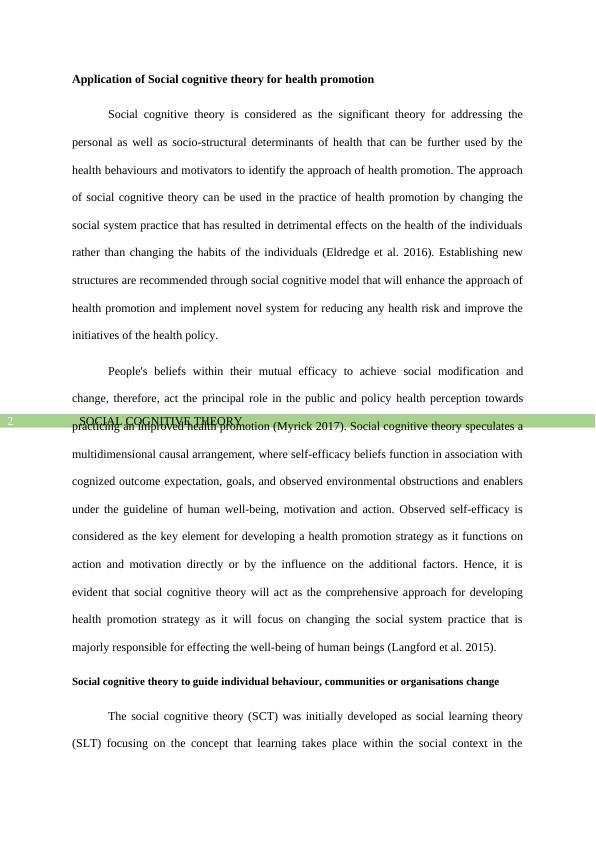Social Cognitive Theory Assesment Report
Added on 2022-09-14
7 Pages1625 Words7 Views
Running head: SOCIAL COGNITIVE THEORY
SOCIAL COGNITIVE THEORY
Name of the Student:
Name of the University:
Author note:
SOCIAL COGNITIVE THEORY
Name of the Student:
Name of the University:
Author note:

SOCIAL COGNITIVE THEORY1
Foundation of social cognitive theory
Social cognitive theory is considered as the learning theory that is used in education,
communication and psychology and explains the human behaviour based on dynamic, three-
way and reciprocal model. Social cognitive theory utilises the process and concept from
behaviouristic, emotional and cognitive models associated with behavioural change. This
theory was developed and founded by Stanford psychologist, named, Albert Bandura. Social
cognitive theory locate people in the form of active agents who influence and are also
influenced by their surrounding or environment setting (Akers and Jennings 2015). Initially
the social learning philosophers were mostly influenced by the drive reduction and
behaviourism principles. In 1963, Richard Walters and Albert Bandura have focused on
extending the social learning theory and stressed on the concept of observational learning,
which is principle natural occurrence that must be considered.
The proposal of social cognitive theory is conducted in the form of agentic
perspective, which recommends that, instead of developing through environmental or inner
factors, the individuals can also develop using their self-developing, self-reflecting, self-
regulating and proactive capabilities (Albert 2019). Hence, it is evident that social cognitive
theory focuses on the significance of observational imitation, modelling and learning and
hence explains the human behaviour as the continuous reciprocal communication between
behavioural, environmental and cognitive influences. There are four different types of
capabilities that is considered as the significant foundation of the social cognitive theory
namely self-regulation capability, vicarious capability, self-reflective capability and
symbolizing capability. The social cognitive theory is applied in different areas of research
such as mass communication, public health, and media effects studies (Mailey et al. 2016).
Foundation of social cognitive theory
Social cognitive theory is considered as the learning theory that is used in education,
communication and psychology and explains the human behaviour based on dynamic, three-
way and reciprocal model. Social cognitive theory utilises the process and concept from
behaviouristic, emotional and cognitive models associated with behavioural change. This
theory was developed and founded by Stanford psychologist, named, Albert Bandura. Social
cognitive theory locate people in the form of active agents who influence and are also
influenced by their surrounding or environment setting (Akers and Jennings 2015). Initially
the social learning philosophers were mostly influenced by the drive reduction and
behaviourism principles. In 1963, Richard Walters and Albert Bandura have focused on
extending the social learning theory and stressed on the concept of observational learning,
which is principle natural occurrence that must be considered.
The proposal of social cognitive theory is conducted in the form of agentic
perspective, which recommends that, instead of developing through environmental or inner
factors, the individuals can also develop using their self-developing, self-reflecting, self-
regulating and proactive capabilities (Albert 2019). Hence, it is evident that social cognitive
theory focuses on the significance of observational imitation, modelling and learning and
hence explains the human behaviour as the continuous reciprocal communication between
behavioural, environmental and cognitive influences. There are four different types of
capabilities that is considered as the significant foundation of the social cognitive theory
namely self-regulation capability, vicarious capability, self-reflective capability and
symbolizing capability. The social cognitive theory is applied in different areas of research
such as mass communication, public health, and media effects studies (Mailey et al. 2016).

SOCIAL COGNITIVE THEORY2
Application of Social cognitive theory for health promotion
Social cognitive theory is considered as the significant theory for addressing the
personal as well as socio-structural determinants of health that can be further used by the
health behaviours and motivators to identify the approach of health promotion. The approach
of social cognitive theory can be used in the practice of health promotion by changing the
social system practice that has resulted in detrimental effects on the health of the individuals
rather than changing the habits of the individuals (Eldredge et al. 2016). Establishing new
structures are recommended through social cognitive model that will enhance the approach of
health promotion and implement novel system for reducing any health risk and improve the
initiatives of the health policy.
People's beliefs within their mutual efficacy to achieve social modification and
change, therefore, act the principal role in the public and policy health perception towards
practicing an improved health promotion (Myrick 2017). Social cognitive theory speculates a
multidimensional causal arrangement, where self-efficacy beliefs function in association with
cognized outcome expectation, goals, and observed environmental obstructions and enablers
under the guideline of human well-being, motivation and action. Observed self-efficacy is
considered as the key element for developing a health promotion strategy as it functions on
action and motivation directly or by the influence on the additional factors. Hence, it is
evident that social cognitive theory will act as the comprehensive approach for developing
health promotion strategy as it will focus on changing the social system practice that is
majorly responsible for effecting the well-being of human beings (Langford et al. 2015).
Social cognitive theory to guide individual behaviour, communities or organisations change
The social cognitive theory (SCT) was initially developed as social learning theory
(SLT) focusing on the concept that learning takes place within the social context in the
Application of Social cognitive theory for health promotion
Social cognitive theory is considered as the significant theory for addressing the
personal as well as socio-structural determinants of health that can be further used by the
health behaviours and motivators to identify the approach of health promotion. The approach
of social cognitive theory can be used in the practice of health promotion by changing the
social system practice that has resulted in detrimental effects on the health of the individuals
rather than changing the habits of the individuals (Eldredge et al. 2016). Establishing new
structures are recommended through social cognitive model that will enhance the approach of
health promotion and implement novel system for reducing any health risk and improve the
initiatives of the health policy.
People's beliefs within their mutual efficacy to achieve social modification and
change, therefore, act the principal role in the public and policy health perception towards
practicing an improved health promotion (Myrick 2017). Social cognitive theory speculates a
multidimensional causal arrangement, where self-efficacy beliefs function in association with
cognized outcome expectation, goals, and observed environmental obstructions and enablers
under the guideline of human well-being, motivation and action. Observed self-efficacy is
considered as the key element for developing a health promotion strategy as it functions on
action and motivation directly or by the influence on the additional factors. Hence, it is
evident that social cognitive theory will act as the comprehensive approach for developing
health promotion strategy as it will focus on changing the social system practice that is
majorly responsible for effecting the well-being of human beings (Langford et al. 2015).
Social cognitive theory to guide individual behaviour, communities or organisations change
The social cognitive theory (SCT) was initially developed as social learning theory
(SLT) focusing on the concept that learning takes place within the social context in the

End of preview
Want to access all the pages? Upload your documents or become a member.
Related Documents
Social Cognitive Theory: Critical Analysislg...
|7
|1736
|1
The internal and external stimuluslg...
|7
|1776
|13
Personal, Environmental, Behavioural Factors from Bandura’s Social Cognitive Theory Modellg...
|3
|1182
|24
Social Cognitive Theorylg...
|7
|1822
|35
Social Cognitive Theory and its Application in a Case Study of Royal Bournemouth and Poole Hospitallg...
|8
|1845
|274
Social Cognitive Theory and its Application in Organizational Behaviourlg...
|7
|1846
|91
